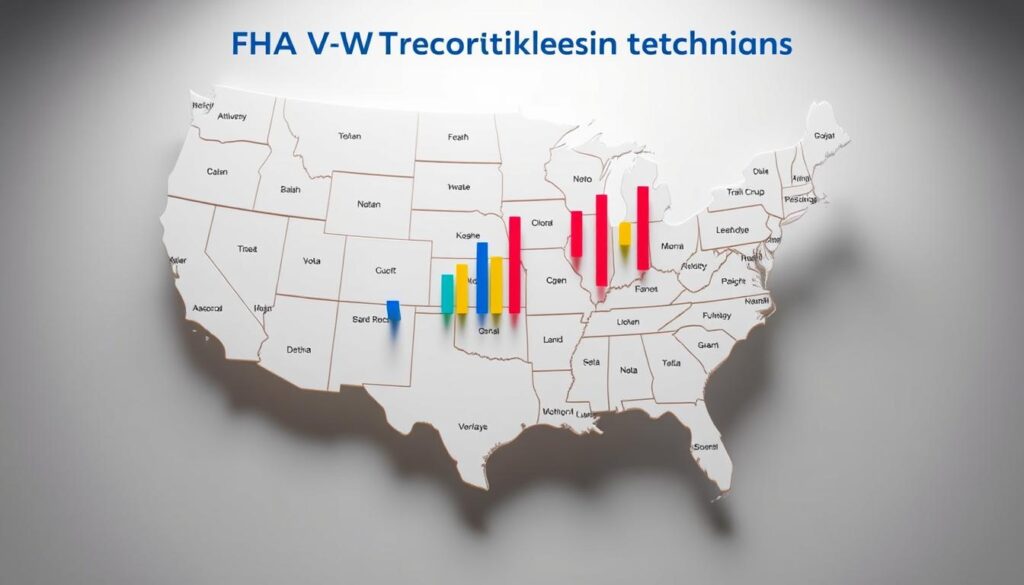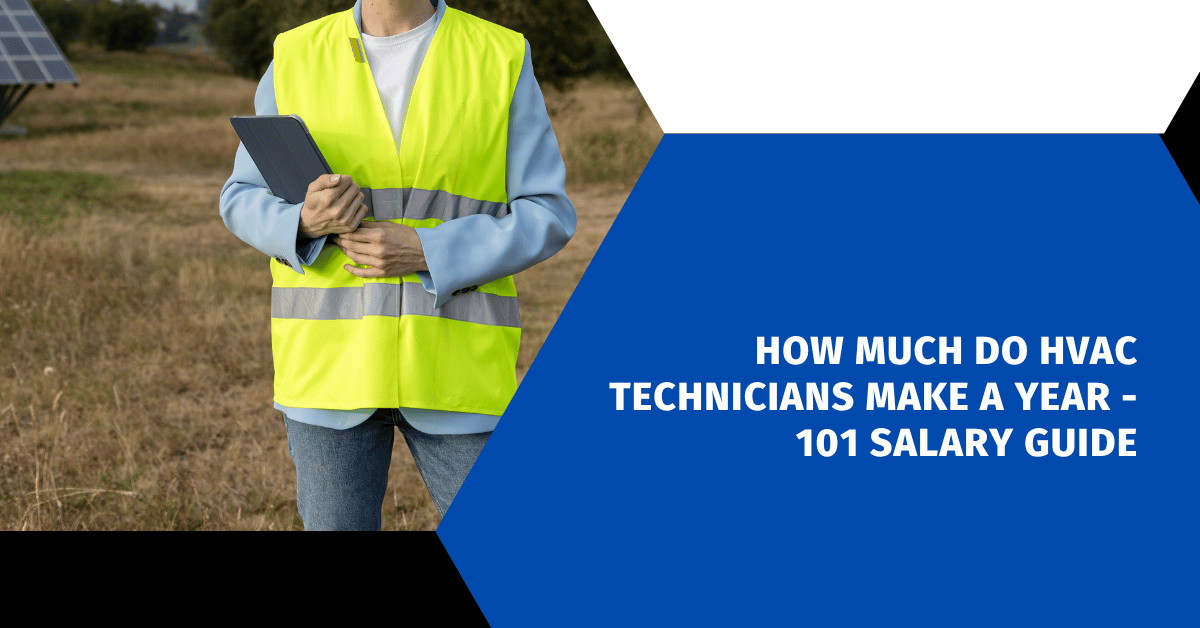Affiliate Disclosure
HVAC Guide Guys is a participant in the Amazon Services LLC Associates Program, an affiliate advertising program designed to provide a means for sites to earn advertising fees by advertising and linking to Amazon.
How Much Do HVAC Technicians Make a Year? Are you curious about the earnings of HVAC technicians? This field offers more than just technical skills. It also provides a financially rewarding career path for those who invest in their professional growth.

Exploring HVAC technician salaries reveals a dynamic career with competitive pay. The salary landscape shows promising opportunities at different experience levels and specializations. Whether it’s residential installations or complex commercial systems, skilled professionals can build a stable and profitable career.
Knowing the earning potentials helps you make informed decisions about this technical field. With the increasing demand for climate control solutions, HVAC technicians are becoming more valuable in the job market.
Key Takeaways
- Average HVAC technician hourly wage is around $29.00
- Annual salaries range from $46,000 to $68,000
- Career offers strong growth opportunities
- Multiple specialization options exist
- Technical skills directly impact earning
Table of Contents
Understanding HVAC Technician Career Outlook
The HVAC industry is growing fast, with lots of chances for a good career. As technology gets better and we care more about the environment, the need for skilled HVAC techs keeps going up. This means you could earn a lot as an HVAC installer.
The U.S. Bureau of Labor Statistics says HVAC jobs will do well in the future. From 2023 to 2033, jobs are expected to grow by 9%. This is great news for anyone thinking about a career in HVAC.
Job Market Growth Projections Through 2033
Several things are making HVAC jobs more in demand:
- More homes and buildings are being built
- People want energy-saving systems
- Old HVAC systems need to be replaced
- New green energy tech is coming out
Demand Factors in the HVAC Industry
Important factors are shaping the HVAC job market:
- Climate change means we need better cooling and heating
- Tighter environmental rules
- New tech in smart homes and buildings
- More focus on clean indoor air
Career Stability and Opportunities
Working in HVAC is more than just good pay. It offers steady work, chances to learn new things, and ways to specialize. You can work on homes or big commercial projects, making a career that’s both fulfilling and secure.
National Average HVAC Technician Salary Overview
Understanding hvac engineer earnings is key to this career. The national average for HVAC technician pay shows a strong financial outlook. This is in the heating, ventilation, and air conditioning field.
The median annual salary for HVAC technicians is $50,590. This offers a solid career choice. Your earnings can change a lot based on several factors:
- Geographic location
- Years of professional experience
- Specialized skills and certifications
- Industry sector (residential vs. commercial)
Looking at salary ranges gives us more details:
- Lower 10% Earnings: About $31,000 a year
- Median Salary: $50,590 yearly
- Top 10% Earnings: Up to $80,000 a year
Your chance to grow in hvac service professional pay is big. By learning more, getting advanced certifications, and focusing on complex systems, you can earn more.
Explore Our HVAC Shop
Looking for top-rated HVAC tools, parts, and accessories? Visit our shop and find the perfect solution for your needs.
Visit the ShopHow Much Do HVAC Technicians Make a Year
Understanding how much HVAC technicians make can help you plan your career. Salaries vary based on experience, location, and specialization. Let’s look at the earnings for HVAC technicians at different career stages.
Entry-Level Salaries: Starting Your HVAC Career
Starting your HVAC career can be tough to predict salary-wise. Entry-level technicians usually make between $46,000 and $54,100 a year. Your salary depends on several things:
- Educational background
- Certification levels
- Geographic location
- Initial technical skills
Mid-Career Earnings: Growing Your Expertise
As you gain more experience, your salary goes up. Mid-career HVAC technicians make between $65,700 and $77,200 a year. Specialized training and additional certifications can really increase your income at this stage.
Senior-Level Income: Reaching Professional Peak
Experienced HVAC pros with deep knowledge can earn a lot. Senior technicians make between $77,200 and $90,800 a year. Your skills become more valuable as you learn complex systems and improve your troubleshooting abilities.
Continuous learning and skill development are key to maximizing your HVAC technician earnings.
Top-Paying States for HVAC Technicians
Exploring the salary for HVAC technicians, some states really stand out. Your income can change a lot based on where you work.
Top states for HVAC techs offer great pay. Alaska, Massachusetts, and New Jersey lead with salaries from $70,500 to $75,660 a year.
- Alaska: Highest average salary at $75,660
- Massachusetts: Competitive wages around $74,130
- New Jersey: Strong compensation at $72,650
Several factors lead to these high salaries:
- Extreme weather needing strong HVAC systems
- Higher living costs in big cities
- Strong industrial and home markets
- Advanced tech markets
“Location can dramatically impact your earning in the HVAC industry.” – HVAC Industry Experts
Think about salary differences when planning your HVAC career. While these states pay well, remember other factors like local demand and skills also matter.
Explore Our HVAC Shop
Looking for top-rated HVAC tools, parts, and accessories? Visit our shop and find the perfect solution for your needs.
Visit the ShopExperience Levels and Salary Progression
Starting as an HVAC technician opens doors to growth and higher pay. Moving from apprentice to master technician is a key step. It can greatly increase your earnings.
Your career path is structured, rewarding your skills and experience. Knowing this can help you earn more in the HVAC field.
Apprentice to Master Technician Path
The HVAC career path has several stages:
- Apprentice Level (0-2 years)
- Journeyman Technician (2-5 years)
- Advanced Technician (5-7 years)
- Master Technician (7+ years)
Skills Development Impact on Earnings
Improving your skills can really boost your salary. Getting technical certifications and ongoing training can lead to higher pay.
| Experience Level | Average Annual Salary | Skill Development Focus |
|---|---|---|
| Apprentice | $35,000 – $45,000 | Basic technical skills |
| Journeyman | $50,000 – $65,000 | Advanced system knowledge |
| Master Technician | $70,000 – $90,000 | Complex system design |
Management Position Opportunities
With more experience, you can move into management. These roles can pay $90,000 and more. They need technical skills, leadership, and good communication.
Strategic career planning transforms your HVAC career from a job into a lucrative profession.
Commercial vs Residential HVAC Salary Differences
When looking at hvac mechanic wages, it’s key to know the difference between commercial and residential HVAC. Commercial HVAC techs usually make more because their work is more complex and on a larger scale.
The main differences in hvac engineer earnings between commercial and residential are:
- System Complexity: Commercial systems are more complex and advanced
- Project Scale: Big buildings need more technical skills
- Specialized Knowledge: Commercial work requires deeper technical knowledge
Commercial HVAC techs often work on:
- Industrial facilities
- Large office buildings
- Hospitals and healthcare centers
- Educational institutions
Residential techs work on smaller installations and maintenance for homes and apartments. While residential work offers steady jobs, commercial HVAC positions often pay more.
Your earnings depend on your specialization, technical skills, and advanced training. Those who master complex commercial systems can earn more.
Getting advanced certifications and specialized training can help close the salary gap between residential and commercial HVAC work.
Explore Our HVAC Shop
Looking for top-rated HVAC tools, parts, and accessories? Visit our shop and find the perfect solution for your needs.
Visit the ShopEssential Certifications That Boost Income
Getting better pay as an HVAC technician isn’t just about working more. Getting the right certifications can really up your earnings. These certifications show you’re skilled and serious about your job.
Choosing the right certifications can change your career path. The best ones prove your skills and open up better-paying jobs in HVAC.
EPA 608 Certification Benefits
The EPA 608 certification is key for any HVAC tech. It shows you can work with refrigerants safely and legally. Employers like technicians with this, often paying them more.
- Higher starting wages
- More job opportunities
- Increased credibility with clients
NATE Certification Impact
NATE certification is the top mark in HVAC. Technicians with it often see their pay go up by 10-15%.
Specialized Training Returns
Training in special areas like solar HVAC or commercial refrigeration can really boost your pay. These skills make you stand out in a crowded market.
“Continuous learning is the key to career advancement in the HVAC industry.” – HVAC Industry Expert
Staying up-to-date with certifications can really pay off. Each one is an investment in your future, leading to better jobs and higher pay.
Geographic Location Impact on HVAC Wages
Your salary as a heating and cooling technician can change a lot based on where you work in the United States. The place you work in greatly affects how much you earn. This is because different areas have different costs of living and economic conditions.
Several key factors influence regional wage differences for HVAC technicians:
- Local economic conditions
- Cost of living
- Climate and seasonal demand
- Population density
- Industrial infrastructure
Big cities usually pay more than rural areas. For example, technicians in California, New York, and Massachusetts make a lot more than those in less crowded states. The pay difference can be up to 50% more.
Coastal and urban areas often have better pay for HVAC jobs. Places with extreme weather or lots of industry need more skilled HVAC workers. This means higher pay for them.
“Location can be a game-changer for your HVAC career earnings.”
Planning your HVAC career means knowing about these pay differences. Look into local job markets and consider moving to areas with better pay. This can help you earn more.

To make more money, look for areas with strong construction, growing homes, and tough weather. These places need skilled HVAC workers, which means better pay.
Explore Our HVAC Shop
Looking for top-rated HVAC tools, parts, and accessories? Visit our shop and find the perfect solution for your needs.
Visit the ShopUrban vs Rural HVAC Technician Salaries
Location is key when looking at HVAC technician salaries. Urban and rural areas have different pay levels. This is due to various factors.
In cities, HVAC techs can earn more. These places offer better pay for several reasons:
- More people need HVAC services
- Bigger projects in commercial and industrial sectors
- Higher wages due to competition
- Complex HVAC systems to work on
Metropolitan Area Premium Pay
In big cities, HVAC techs can make up to 20% more. Places like New York, San Francisco, and Chicago pay well. This is because:
- The cost of living is higher
- Systems are more advanced
- There’s more competition among providers
Small Town Market Rates
Rural areas have different salary levels. While pay might be lower, there are benefits:
- Less competition
- Building a loyal customer base
- Lower costs
- Strong community ties
Your salary depends on location, skills, and demand. Knowing these differences helps plan your HVAC career.
Factors Affecting HVAC Technician Pay
Your hvac installer income isn’t just a random number. Many important factors affect how much you can earn as an HVAC mechanic. Knowing these can help you increase your hvac mechanic wages over time.
Professional experience is the biggest factor in salary. Starting out, you’ll likely earn less. But as you gain skills and experience, your pay will go up a lot.
- Years of hands-on experience
- Specialized technical certifications
- Geographic work location
- Industry-specific expertise
- Company size and reputation
Certifications are key to your income. The Environmental Protection Agency (EPA) 608 Certification and North American Technician Excellence (NATE) credentials boost your value. Employers pay more for technicians with these qualifications.
“Invest in your skills, and your salary will reflect your commitment.” – HVAC Industry Expert
Your work environment greatly affects your earnings. Cities with high HVAC demand pay more than rural areas. Working in commercial or industrial HVAC can also lead to better pay.
Being part of a union and getting company benefits can also increase your earnings. Some companies offer bonuses, health insurance, retirement plans, and tool allowances. These add to your overall income.
Explore Our HVAC Shop
Looking for top-rated HVAC tools, parts, and accessories? Visit our shop and find the perfect solution for your needs.
Visit the ShopBenefits and Additional Compensation
HVAC service professionals get more than just a salary. They enjoy a wide range of benefits that boost their total earnings. It’s important to know these benefits when looking at hvac engineer earnings.

As an HVAC technician, you can earn more than just your base salary. These extra perks make the job more appealing. They also offer financial security beyond just wages.
Health Insurance and Retirement Plans
Many HVAC employers offer great benefits. These include:
- Comprehensive medical coverage
- Dental and vision insurance
- 401(k) retirement savings plans
- Life insurance options
Bonus Structures and Overtime
There are many ways to earn more as an HVAC service professional:
- Performance-based bonuses
- Overtime compensation
- Commission structures for sales-related work
- Annual performance incentives
Company Vehicle and Tool Allowances
Companies also offer perks that increase your earnings:
- Company-provided vehicles for work-related transportation
- Tool purchase and maintenance allowances
- Fuel reimbursement
- Equipment replacement programs
HVAC careers offer more than just a good salary. They come with a full compensation package. Understanding this package shows the real value of working in this field.
Conclusion
The HVAC industry is full of chances for skilled workers looking for stable jobs. You could earn between $46,000 and $90,800 a year, based on your skills, where you work, and your special talents. Knowing what affects how much you can earn will help you grow in your career.
Getting the right certifications, always improving your skills, and choosing the right place to work can really boost your earnings. Getting EPA 608 and NATE certifications, taking more training, and working in different areas like commercial and home services can open up new ways to make money and advance in your career.
Your success in HVAC depends on always learning, being flexible, and growing professionally. With the industry growing, there are lots of chances for those who keep up with new tech and offer top-notch service. Being great at fixing complex systems and making customers happy is essential to reaching your career goals.
As more people need skilled HVAC workers, your smart career planning can turn this job into a rewarding and profitable career. Keep learning, stay open to change, and keep improving your skills to do well in this fast-changing field.

